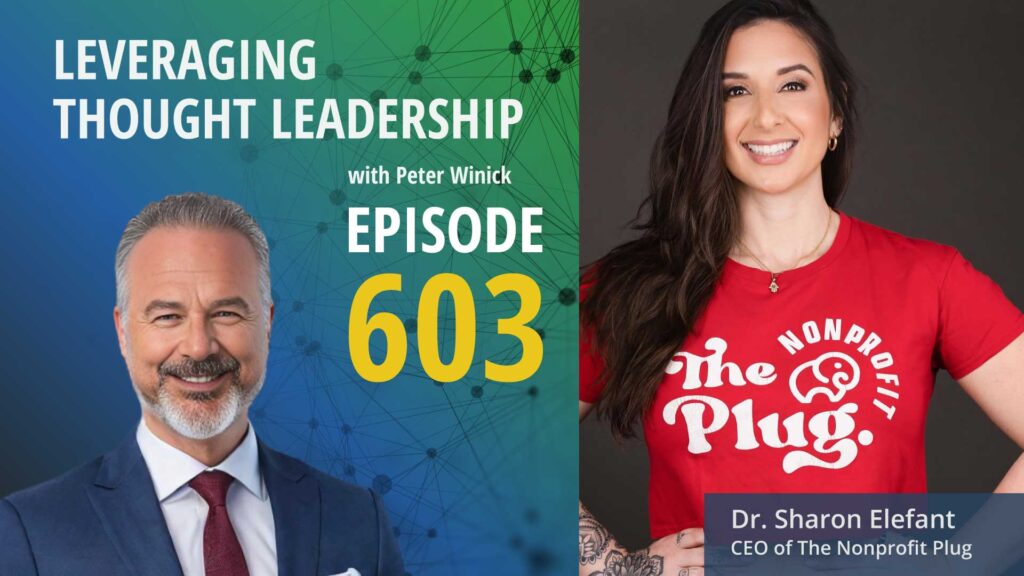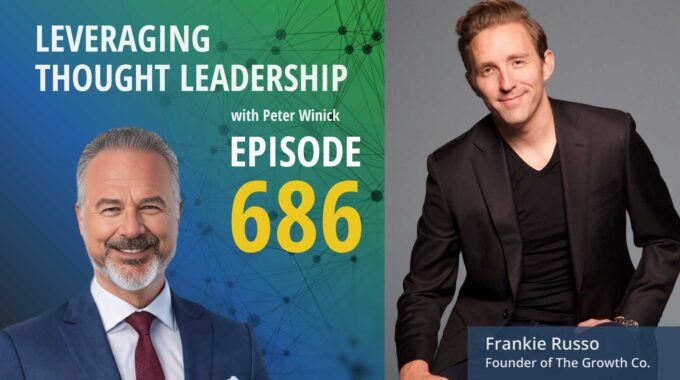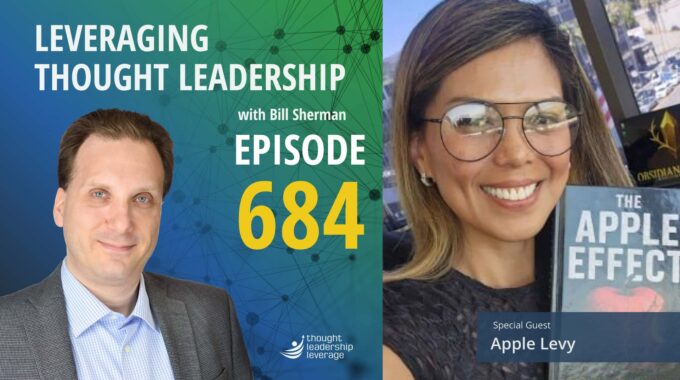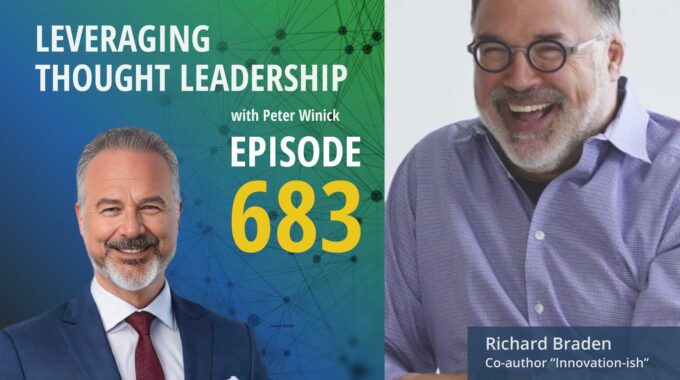How “collective genius” drives continuous growth. This episode shows how to scale thought leadership beyond…
Plugging into Nonprofit Success | Dr. Sharon Elefant

Mastering Strategy, Relationships, and Monetization in the Nonprofit World
In this episode, Dr. Sharon Elefant, CEO of The Nonprofit Plug, shares how she transformed her passion for nonprofits into a thriving consultancy. She reveals key strategies for scaling expertise, monetizing services, and building thought leadership in the nonprofit space.
How do you turn a passion for nonprofits into a thriving business?
Dr. Sharon Elefant, Founder & CEO of The Nonprofit Plug, joins us to share her remarkable journey. Initially aiming to become a hospital administrator, Sharon found herself running outreach programs for the VA health system across Southern California and Nevada. This exposed her to the world of nonprofits and strategic partnerships, which quickly became her passion. As she deepened her involvement with nonprofits, Sharon realized she had a unique skill: she could connect these organizations with the exact resources they needed. Her growing reputation as “The Plug” for nonprofit solutions laid the groundwork for a full-time consulting business. 
Turning her passion into profit was the next challenge. Sharon describes how she evolved from a free resource into a paid expert. At first, she was providing advice and making introductions for free. But as she took on more complex tasks like grant writing and strategic development, her value became undeniable. Nonprofits trusted her expertise and were willing to pay for her to take on the heavy lifting. What began as offering helpful tips turned into thought leadership, with Sharon producing content, guides, and resources that established her as the go-to person in her field. Her knowledge wasn’t just in demand—it became a business.
Today, The Nonprofit Plug offers a range of services to meet the diverse needs of nonprofit organizations. Sharon talks about how she structured her offerings into packages that include everything from grant writers to consultants and coaches, covering every aspect of nonprofit management. She introduced a new program that provides all-inclusive support for an entire year, helping nonprofits hit the ground running in the first 90 days. This package model offers a clear cost-saving advantage compared to hiring individual experts. It’s all about providing comprehensive, long-term value at an accessible price.
Sharon also offers valuable advice for thought leaders and entrepreneurs trying to break into the space. Her recommendation? Start small but consistent. Posting daily tips on social media—short, digestible clips that share valuable insights—can go a long way. She suggests recording a few tips in one sitting and rolling them out over time, so it’s manageable and cost-effective. But building a brand takes patience. She advises giving it at least three to five years before deciding if your business has the momentum to sustain itself. And don’t rush to leave your day job—wait until your venture is fully capable of supporting both you and your business.
Dr. Sharon Elefant’s story is a testament to the power of relationships, expertise, and thought leadership in building a successful business. Here are 5 Things You Should do to Become a Thought Leader in Your Industry according to Thought Leadership Leverage Founder and CEO Peter Winick.
Three Key Takeaways:
Turn Expertise into Revenue: Dr. Sharon Elefant transformed her deep knowledge of nonprofits and networking skills into a thriving business by offering grant writing, consulting, and administrative services that nonprofits were willing to pay for, rather than struggling to do it themselves.
Package Value for Impact: The Nonprofit Plug offers bundled services—grant writers, consultants, and expert coaching—allowing nonprofits to get immediate results and long-term support at a cost-effective price, demonstrating the importance of scalable, value-driven offerings.
Consistency Builds Thought Leadership: Sharon’s advice to emerging thought leaders is to start small and be consistent, using platforms like social media to post daily tips. Success doesn’t happen overnight, but with a long-term vision and patience, expertise can grow into a profitable venture.
Sharon has spent years working to become the Plug for the nonprofit industry. Here are 5 Things You Should Do To Become a Thought Leader In Your Industry according to Thought Leadership Leverage Founder and CEO Peter Winick.
Transcript
Peter Winick And welcome, welcome, welcome. This is Peter Winick. I’m the founder and CEO at Thought Leadership Leverage. And you’re joining us on the podcast, which is Leveraging Thought Leadership. Today, my guest is Dr. Sharon Elephant. She is the founder and CEO of the nonprofit Plug, which is a consultancy that works with various individuals to form and incorporate 5013C tax exempt nonprofit organizations. They specialize in supporting nonprofits to develop their organizational and administrative infrastructure, strategic vision implementation plans and funding growth, development and relationship cultivation. And she’s got some really cool back stories and lots of other things. So welcome aboard, Sharon.
Sharon Elefant Thank you. That sounded so cool.
Peter Winick You’re dressed to meet yourself, right?
Sharon Elefant I have. I am impressed due to my style of it.
Peter Winick There we go. So how did this happen? Tell us. And you and I spoke last week. But how did you get here? Because one of the things that I love about the fall leadership space is when I ask that question of people, I never get the same answer twice versus in most professions. Ask an accountant or a lawyer, whatever. How they went there and your and your nap. Knapp went to dental school, became a dentist, right?
Sharon Elefant For sure. Yeah.
Peter Winick How did you get here?
Sharon Elefant I love it. So great question. How did I get to the nonprofit plug? So in a prior life, my academic training was to become a hospital administrator. I went that route. I did it. I ran the Southern California and Southern Nevada outreach programs for the VA health system with homelessness, and through that was really involved in outreach programs and partnering with nonprofits and strategic partnerships. So I knew I loved that part, didn’t love the VA and did not love government.
Peter Winick Right, right.
Sharon Elefant My mouth is too free thinking and open for that kind of life. So I ended up getting recruited by a veterans service organization, went and worked for them for several years, met bazillions of nonprofits, constantly volunteering, constantly doing community work, constantly connecting people and partnering people and finding resources. And I was working on my doctorate at the same time and ended up getting laid off from that veterans service organization. So kind of a side hustle to keep my income up while I was finishing my doctorate. I was just, you know, grant writing, finding funding, finding partnerships for other nonprofits and colleagues and things like that that people in Los Angeles were calling me the plug. And I was like, cool. Like, I like being the plug, like, number one. That sounds really cool. Number two, I just love being that person for everybody. That’s probably a strength and a weakness of mine. I just, I, I love, love, love. Finding resources and problem solving for everyone. It’s also my downfall. So while doing that, my family thought I was dealing drugs. I think I had told you about that because I was like, Well, and I even had a phone number that was like the plug, which is very hard to get, by the way. Like, you can’t even get that not one state in the entire United States. So I had to do like or for plug, not the plug.
Peter Winick Right.
Sharon Elefant Then I had to clarify with the whole elephant herd that like, no, I’m not a drug dealer. I mean, if you if you need me to find somebody, I can. But I am the nonprofit plug. And so it kind of just became my nickname for a while. And I was like, Damn, this is really fun. Like, I want to make this my full-time thing. So I illegally fired.
Peter Winick Stay there for a second. So this is one way you found it was people just they kind of got a sense of you’re the get it done check. Right.
Sharon Elefant I know I’m the plug.
Peter Winick Right. So then they just started asking you and I’m assuming when they were asking you, there was no invoice involved. You’re like, Wow, this is pretty cool. Yeah, but at what point did they ask you and you figured out you can get paid for this? Because that’s an epiphany moment.
Sharon Elefant Really, through the grant writing. It was once I started doing things that literally took my time in administrative paperwork and things like that. That’s when I was able to start invoicing. It wasn’t so much in the like, let me make you an introduction to someone or Hey, go check out this. It wasn’t so much in that quite yet. It was really in the when it became administrative, more like work for someone, you.
Peter Winick Know, stay there for a minute because in many professional services what we do is what we do, right? Accounting law, consulting, whatever or whatever. And there’s lots of other people that can do it a little bit better, a little bit worse for a little bit more money or a little bit less. So a way to differentiate is to be that that hub and spoke, that connector that yeah, make sure that you’re not getting paid for. But it’s a way to stand out amongst all the others that’s doing. And I don’t mean just say, you know, Grant writing to some degree is a commodity right? So you to Google grant writers, the people that are popping up on that SEO the it’s probably going to be lowest cost provider that’s going to win for people that go in through that door. It is.
Sharon Elefant Yeah. And. Really doing that process. That’s what really established me as the thought leader, which then allowed me to get to the point of Now people pay me to speak a word. People will pay for a word that comes out of my mouth now, and people know that I’m the go to in the industry. I don’t have to fill out a grant application or do an administrative piece of work for people to pay me now. Now I am that subject matter expert. I am that go to. I produce the content that gives people the tips, tricks and techniques. The process flows. Now, I don’t.
Peter Winick Stay there for a minute because I think certain people in certain industries struggle with when you’re that go to when you’re that, you know, there’s a there’s a line between subject matter expert and thought leader, etc. that when you give it all away, well, geez, what would they pay you for? They don’t really understand that. The more you give away, in essence, the more you get because there’s 1%.
Sharon Elefant Yeah.
Peter Winick Folks that will follow what you do. Never hire you or anybody else for lots of reasons and get to a good outcome. But then there’s the other group that have the potential to be a client that see it and it’s doctor and they know you probably know what you’re talking about because you’re talking about a lot. And when I eat those services, I’d gladly pay you versus anybody else. Yes.
Sharon Elefant And I’ll give you a perfect example. Here’s where that comes into play. Right. Because I will give I know giving. I give people information. I’ll give it all day long for free right now, because I always get clients out of it. And I always find that I can tell you what to do all day long and I can give you guidance, but are you really going to do it? And so a perfect example of that is I have a downloadable PDFs and workbooks and things like that, give or create, for example, a grant readiness little checklist like don’t boom, boom, the end people. I give that to people all the time because they’re like, Well, you know, I just I just need like somebody to give me like a to do list. And I’m like, okay, yeah, here, here’s my grant readiness checklist. But they but then what happens is, one, it’s very time consuming to write a grant application. It’s very specific in the wording. And this really goes for like any of the services that we provide, really. People are like, Sharon, teach me how to do QuickBooks in accounting. Like, well, go to YouTube University and look at that. But when it comes down to the actuality of it, they can’t actually implement the process. And also that kind of goes towards like I share like my packages, I share like you can come on and see what services we provide and people, you know, will want to reenact those services. But do you have the skill set and the capacity to actually implement it?
Peter Winick And I think I think it also validates because it shows, I’m allowing you to write a grid, you just write a grant, right? But then when you when you look at a checklist, you’re like, wow, if you’re on the fence, there’s so much more to this than I ever thought. Just this was, which is the high level, you know, the 58 things you need to do show is them. There’s dues. There’s a lot more to do here than you ever thought. Do you really do this? Do you really, really want to do this?
Sharon Elefant And a perfect example is starting a nonprofit or even start people who want to start an LLC or a nonprofit. You can you can go, you can go do it yourself. It’s plenty of resources online to learn how to do formations and incorporations. But what happens is you checkbox the wrong thing on the form, you write the wrong one. Word like when you do a nonprofit, fine. If you put one word wrong, they reject you all day long. And I have 100% success rate because I know exactly what the IRS needs. I know exactly how to phrase things. I know exactly what the definitions of a charitable organization are. I know what an appropriate and legal formation is for an LLC. And that’s where my subject matter expert comes in, is through my experience. And so that’s what people are paying for, is they’re paying for 100% accuracy. Get it done, give me the resource, give me the funding, give me the guidance based on my experience. You know, I have or 15 years. I know it don’t look like it because I look like I’m, you know, in my 20s. But have I have those years of experience. Not only that, I’ve been an executive director of a nonprofit. I’ve been, you know, every position in every kind of company, bottom up to the drug. I planted plants. I wanted watered plants as a as a job. I’ve been a ship picker upper for dogs like I have been all of these positions. So it comes with experience of trial and error. So I can tell you, here’s how I raise $25,000 in a day. Here’s how I got this grant funding. Here’s I got this donor or this person to be on my board.
Peter Winick And if you’re enjoying this episode of Leveraging Thought Leadership, please make sure to subscribe. If you’d like to help spread the word about our podcast, please leave a five-star review at ratethispodcast.com/ltl and share it with your friends. We’re available. On Apple Podcasts and on all major listening apps as well as at ThoughtLeadershipLeverage.com/podcast.
Peter Winick So let me ask you this then. So there’s. Indirect ways of monetizing the thought leadership and direct way. So indirect would be you’re building your brand, you’re building a platform. When people are ready to pull the trigger, they’re like, that’s the person. Are there ways that you’re directly monetizing it by in terms of putting it into packages or learning or assessments or what does that path look like?
Sharon Elefant Yeah. So for sure. So I think our direct ways of monetizing our firm now are we have you can purchase packages with us for they comes with a grant writer, it comes with a consulting, it comes with subject matter experts on all levels of what your nonprofit might need and coaching. You can purchase a monthly accounting package just like you would another bookkeeper. Like we have bookkeepers on staff and accountants and CPAs. You can purchase hourly support. Absolutely.
Peter Winick Are you able to capture a premium? So one is you’re able to attract clients through all those activities. So that’s good. That reduces your marketing spend. Are you able to capture a premium in the market? Because if I was just strictly looking for bookkeeping services and I’m sure if I went online, it’s going to be some outsource group and, you know, pick a place, right? That’s one or.
Sharon Elefant Just pop up.
Peter Winick Yeah. QuickBooks or something in the Philippines or whatever. And it’s going to be, you can do this for $4. And I like whatever. Right. And for some people that might be a fine solution. You know, Aster across historic are you giving away, you know, sensitive information, etc. Are you able to capture like how many the conversations are you having with clients early on or around price versus value and experience?
Sharon Elefant So we just implemented a new program like literally within the past couple of weeks. So before you used to be like for grant services because that’s, that’s it’s easy and hard to sell, like selling bookkeeping, easy selling. Like we’ll do your full billing for you easy. But when we’re selling like concepts like grant writing, board development, engagement, strategic planning, mindset coaching, things like that, a little bit different. So we used to sell it in hourly packages ten, 20, 30 hours. Now what we do is we’ve removed out the word hourly. We don’t do anything hourly. It’s verbal based and we provide donor cultivation, cultivation, acquisition, we provide a grant writer. We just don’t do hourly. We provide coaching on every level of how to get funding and resources into your organization so people aren’t relying on grants. And I and what we do when we pitch those is we say, here’s our cost for the full year. So you’re committing to monthly, you pay 50% down and then the rest is split out monthly. Yeah. And through that it’s where it, where it really gets people is in that first 90 days we’re going to accomplish all of this list.
Peter Winick So it’s all heavily frontloaded.
Sharon Elefant Yeah heavily frontloaded so we can get them immediate impacts so that then they’re also trusting us as an organization to really service and support them. And we put out there what this value would be out in the real world if you were to hire like if one of our packages for a year might be between 45 and 55,000 and that comes with a team of us versus if you were to go out into the real world and put someone on salary, you’re going to maybe get one person doing maybe like one thing for that. And that’s sort of where we’re so impactful for folks.
Peter Winick Got it. So. Advice that you would give to someone, forget nonprofit. But in essence, if we look at you as a service business to a particular industry, so lots of folks could fit into that definition. It regards as a for profit nonprofit, whatever, but a service business that’s doing things that are to some degree, you know, there’s some specialization, but there’s some pieces of it that are a commodity and they haven’t delved into thought leadership yet at all. They’re just doing their thing and getting referrals and gaining client losing clients, whatever. What would you do to encourage them to dive in and put out thought leadership and where would they start and how much time to give it before they saw the results and all that I give them? Give me a sense of what that journey would be.
Sharon Elefant So if I was that person, I, I honestly would start with social media and just posting every single day like a 10 to 15 second clip of Tip of the Day. I mean, that’s where that’s where I did start. And that’s what worked really well for my company. And people love that like Tip of the Day. So that’s where I would start. And that doesn’t take you more than like, I don’t know, maybe an hour a day to do something like that in an hour. You could even record 60 minutes of tips and break it up into, you know, a week or two worth of tips posted online cost you nothing. As people start to kind of engage with your tip and trick of the day or if they test out your tip and it works for them, you got a client.
Peter Winick Right. And then how long do you stick? Because, you know, this is not a get by business, right? How long should they stick with it? Before they either quit. We hope not or change tactics or expect to see any sort of outcome. That’s tangible.
Sharon Elefant Minimum six months reevaluate at six months to give it a couple of years. People really need to give their business 3 to 5 years to really see if you should stay in or not. So I always tell people, do not quit your 9 to 5 if you have one until your new whatever it is you’re doing, if you’re creating your own business, is fully funding your life on top of the overhead for the business. So I say you give this whatever new thing you’re testing a minimum of six months to collect the data, evaluate the impact, maybe tweak some things and then keep going. But really, it’s for a long haul. It’s a I’m five almost five years in and I’m still evaluating the impact of what’s going on and the impact of having employees and contractors and making sure every single client gets what they need. Because I want to be a Fortune 500 corporate company with a boutique feeling because that’s what nonprofits and nonprofits need handholding. And, you know, when you kind of get up into that high level corporate level, people get dropped through the cracks. And I do not want nonprofits drop through the cracks. There’s already too much misappropriation. Yeah, nonprofits getting fucked over and people fraudulently using nonprofits. I mean, me and some of my staff have been through that with other third party contracted companies where we got screwed by them because they were just using.
Peter Winick Us taking advantage. Yeah, well, this is been great. I appreciate your time, Sharon, and thank you for sharing your journey and your story with it.
Sharon Elefant Yeah, Awesome. Thank you for having me. I appreciate it. So much fun.
Peter Winick To learn more about Thought Leadership Leverage, please visit our website at ThoughtLeadershipLeverage.com. To reach me directly, feel free to email me at Peter at ThoughtLeadershipLeverage.com. And please subscribe to Leveraging Thought Leadership on iTunes or your favorite podcast app to get your weekly episode automatically.





